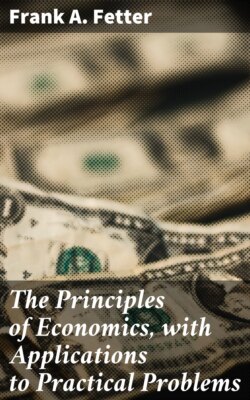Читать книгу The Principles of Economics, with Applications to Practical Problems - Frank A. Fetter - Страница 15
На сайте Литреса книга снята с продажи.
§ I. MATERIAL WANTS, THE PRIMARY ECONOMIC MOTIVES
ОглавлениеFeeling urges to economic actions
1. A logical explanation of industry must begin with a discussion of the nature of wants, for the purpose of industry is to gratify wants. An economic want may be defined as a feeling of incompleteness, because of the lack of a part of the outer world or of some change in it. Often the question asked when one first sees a moving trolley car or automobile or bicycle is: What makes it go? The first question to ask in the part of the study of economic society here undertaken is: What is its motive force? Without an answer to that question one cannot hope to understand the ceaseless and varied activities of men occupied in the making of a living. The question merits long and careful study, but the general answer is so simple that it seems almost self-evident: The motive force in economics is found in the feelings of men. It is men's desire to make use of men and things about them which calls forth all the manifold phenomena studied in economics.
Animal species shaped by their environment
2. Wants among animals depend on the environment; that is to say, the utmost that creatures of a lower order than man can do is to take things as they find them. The imagination and intelligence of animals are not developed enough to lead them to desire much beyond that which is ordinarily to be obtained. And so the environment shapes and affects the animal. The fish is fitted to live in the water and thrives there, and we must believe, enjoys living there. The horse and the cow like best the food of the fields, and so each species of animal, in order to survive in the severe struggle for existence, has been forced to fit itself to the conditions in which it lives. After the animal has been thus fitted, its desire is for those things normally to be found in its surroundings. So different animals desire or want different things, but always it is the environment that determines the want, and not the want that determines the environment.
Simple wants of primitive men
3. In simpler human societies, wants are mostly confined to physical necessities; that is, in the earlier stages of society, man's wants are very much like those of the animals. Man bends his energies to securing the things necessary to survival. He feels the pangs of hunger and he strives to secure food. He feels the need of companionship, for it is only through association and mutual help that men, so weak as compared with many kinds of animals, are able to resist the enemies which beset them. He needs clothing to protect him against the harsher climates of the lands to which he moves. For the same purpose, to protect himself against the cold and rain, he needs a shelter, a cave, a wigwam, or a hut; for a house is but a larger dress.
Manifold wants in civilized society
4. In human society, wants develop and transform the world. In the rudest societies of which there is any record, savages are found with wants developed in a great number of directions beyond the wants of any animals. Man is not a passive victim of circumstances; his wants are not determined solely by his environment; his desires soar beyond the things about him. As men become more the masters of circumstances, their desires anticipate mere physical wants; they seek a more varied food of finer flavor and more delicately prepared. Dress is not limited by physical comfort, for one of the earliest of the esthetic wants to develop is the love of personal ornament. The rude hut or communal lodge to protect against rain and cold becomes a home. Out of the earlier rude companionship develop the noblest sentiments of friendship and family life. Seeking to gratify the senses and the love of action, men develop esthetic tastes, the love of the beautiful in sound, in form, in taste, in color, in motion. And finally, as the imagination and intellect develop, there grow up the various forms of intellectual pleasures—the love of reading, of study, of travel, and of thought.
The various wants of man are sometimes classified as necessities, comforts, and luxuries, but all economists take care to emphasize that these terms have only relative meanings which, in the rapidly changing conditions of modern life, are changing constantly. The comforts of one generation, or of one country, become the necessities in another; and luxuries becoming comforts, are looked upon finally as necessities. And as the desires grow, they more and more alter the world. Man has changed the face of the earth; he has affected its climate, its fertility, its beauty, because, either for better or for worse, his desires have impressed themselves upon the world about him.
